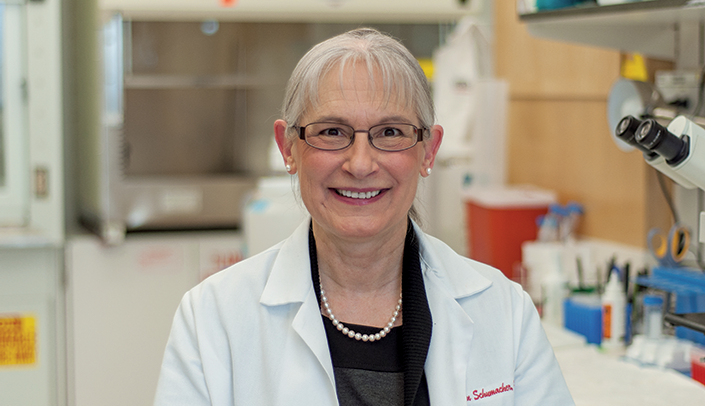The family caregiver is a lifeline for a loved one with cancer.
While substantial information exists on caregiver burden, less attention has been paid to the increasingly complex tasks caregivers are being asked to do – tasks once done by professional nurses in hospitals.
Experts say caregivers need education and training.
Karen Schumacher, Ph.D., and an interdisciplinary team of collaborators at UNMC, are working on a four-year, $720,000 grant from the American Cancer Society to study the experience of family members caring for a loved one with cancer. The study will zero in on how family members take on the caregiving role, explore what their needs are, and compare the differences in urban and rural caregiving challenges.
Ultimately, the goal is to develop and test interventions to support family caregivers and promote the best possible outcomes for both patients and caregivers. A recent survey found that an estimated 3.4 million caregivers in the U.S. are caring for an individual with cancer. That’s nearly equivalent to the population of Los Angeles.
“Taking care of a cancer patient today is unprecedented in its complexity. Something that may seem routine to a nurse, such as getting a patient with a surgical incision out of bed, is a skill that many lay people haven’t learned,” said Dr. Schumacher, UNMC College of Nursing professor and principal investigator of the study. “Patients can go home with incisions, a tracheostomy and feeding tubes and many new medications.”
She said preliminary data from the study indicates that the discharge instructions family caregivers receive may not be sufficient for implementing the caregiving role at home.
“Family caregivers take on the role with little preparation and many feel overwhelmed,” Dr. Schumacher said.
Caregivers deal with issues such as managing multiple symptoms, making decisions about what to do when the patient’s condition changes, managing other chronic conditions in addition to cancer, and navigating multiple health systems in the quest for the most effective treatment.
“The good news is that we’re doing better with symptom management. Nausea, fatigue, sleep issues, pain, bowel issues can all be managed better now than in the past, but it means medication management is now more complicated and requires caregivers to decide how much medication to give and when.”
The study will be among the first to explore the relationship between the caregiving role and caregiver and patient outcomes during the first six months of cancer treatment.
Researchers are recruiting up to 100 family caregivers and their adult patients who’ve been recently diagnosed with head, neck, lung, esophagus, liver, stomach, pancreas and colon cancer and are within four weeks of beginning treatment at Nebraska Medicine.
Participants will be interviewed about their caregiving experiences and complete a questionnaire every month for six months. A small stipend is available.
For information about the study, contact Dr. Schumacher at 402.559.2092 or kschumacher@unmc.edu.
